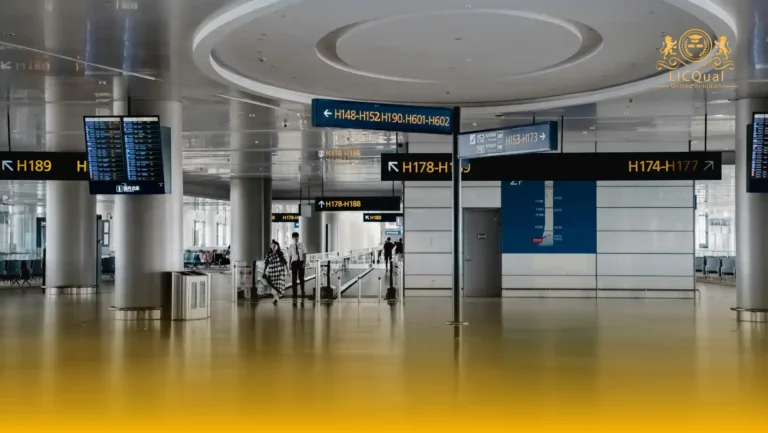The LICQual Award in Fire and Hazardous Materials Incident Investigation is a specialized qualification designed to equip professionals with the skills needed to investigate incidents involving fires and hazardous materials.
With industries like manufacturing, construction, and chemical processing continuously facing risks associated with fires and hazardous substances, this course is essential for anyone looking to enhance their expertise in managing and investigating such incidents.
This course offers practical knowledge in identifying the root causes of fires, chemical spills, and other hazardous incidents, ensuring that professionals can take appropriate corrective actions. Whether you are a health and safety officer, fire investigator, or a risk manager, the LICQual Award in Fire and Hazardous Materials Incident Investigation will provide you with the tools necessary to conduct thorough investigations, ensuring both compliance with safety regulations and the prevention of future incidents.
The LICQual Award in Fire and Hazardous Materials Incident Investigation offers a comprehensive curriculum that focuses on understanding the causes and impacts of fire and hazardous materials incidents. Participants will learn essential investigation techniques, from evidence collection and data analysis to root cause analysis and developing preventative measures. The course also covers vital topics such as risk assessment, legal considerations, and the importance of safety protocols in managing hazardous materials.
By the end of this qualification, you will have the necessary skills to investigate incidents effectively, identify contributing factors, and prepare reports that meet regulatory standards. This qualification is ideal for individuals in the fire safety, environmental health, and industrial safety sectors, providing a strong foundation for anyone working in the prevention, investigation, or management of fire and hazardous materials incidents.
Course Overview
Qualification Title
LICQual Award in Fire and Hazardous Materials Incident Investigation
Total Units
6
Total Credits
6
GLH
12
Qualification #
LICQ2200060
Qualification Specification
To enroll in the LICQual Award in Fire and Hazardous Materials Incident Investigation, applicants must meet the following criteria:
|
Qualification# |
Unit Title |
Credits |
GLH |
|---|---|---|---|
|
LICQ2200060-1 |
Introduction to Fire and Hazardous Materials Incident Investigation |
1 |
2 |
|
LICQ2200060-2 |
Fire Incident Investigation Techniques |
1 |
2 |
|
LICQ2200060-3 |
Hazardous Materials Identification and Risk Assessment |
1 |
2 |
|
LICQ2200060-4 |
Data Collection and Evidence Gathering in Hazardous Materials Incidents |
1 |
2 |
|
LICQ2200060-5 |
Investigative Methodologies and Root Cause Analysis |
1 |
2 |
|
LICQ2200060-6 |
Report Writing, Documentation, and Legal Considerations |
1 |
2 |
By the end of this course, learners will be able to:
1. Introduction to Fire and Hazardous Materials Incident Investigation
- Demonstrate an understanding of the key principles, procedures, and roles involved in fire and hazardous materials incident investigations.
- Identify and explain the legal, regulatory, and ethical frameworks applicable to fire and hazardous materials incidents.
- Recognize the importance of thorough investigations in preventing future incidents and promoting safety.
2. Fire Incident Investigation Techniques
- Apply appropriate techniques to determine the origin and cause of fire incidents.
- Understand the behavior of fire in various environments and the factors that contribute to fire spread and intensity.
- Utilize fire investigation tools and technology to gather and analyze evidence accurately.
3. Hazardous Materials Identification and Risk Assessment
- Identify hazardous materials commonly found in industrial and commercial environments.
- Assess the potential risks associated with hazardous materials and the impact they can have on human health and the environment.
- Evaluate the severity of hazardous materials incidents and apply risk management strategies to mitigate hazards.
4. Data Collection and Evidence Gathering in Hazardous Materials Incidents
- Employ effective data collection techniques for hazardous materials incidents, ensuring accurate and reliable evidence.
- Demonstrate proficiency in gathering evidence related to spills, leaks, and chemical reactions during hazardous materials incidents.
- Use specialized tools and technologies for collecting and preserving evidence in hazardous environments.
5. Investigative Methodologies and Root Cause Analysis
- Apply investigative methodologies, including root cause analysis (RCA), to identify underlying causes of fire and hazardous materials incidents.
- Utilize tools such as the 5 Whys, Fishbone diagram, and fault tree analysis to conduct thorough investigations.
- Analyze the findings to develop actionable recommendations to prevent similar incidents in the future.
6. Report Writing, Documentation, and Legal Considerations
- Write clear, detailed, and legally compliant investigation reports, documenting findings, causes, and recommended corrective actions.
- Structure reports to effectively communicate incident details, root causes, and preventive measures to stakeholders.
- Understand the legal and regulatory requirements for documenting and reporting fire and hazardous materials incidents to ensure compliance with industry standards.
This diploma is ideal for:
Assessment and Verification
All units within this qualification are subject to internal assessment by the approved centre and external verification by LICQual. The qualification follows a criterion-referenced assessment approach, ensuring that learners meet all specified learning outcomes.
To achieve a ‘Pass’ in any unit, learners must provide valid, sufficient, and authentic evidence demonstrating their attainment of all learning outcomes and compliance with the prescribed assessment criteria. The Assessor is responsible for evaluating the evidence and determining whether the learner has successfully met the required standards.
Assessors must maintain a clear and comprehensive audit trail, documenting the basis for their assessment decisions to ensure transparency, consistency, and compliance with quality assurance requirements.







